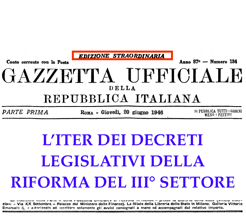
Vorrei mettere a disposizione dei gentili lettori di Quinonprofit qualche nozione che meglio qualifica il mio pensiero in merito all’Impresa Sociale.
Riassumo qui il mio pensiero: l’idea di per sé dell’impresa sociale è ottima; la appoggio con tutta la mia convinzione. I benefici comunitari da una buona conduzione e sviluppo di imprese sociali sono enormi.
Detto questo, la legge che è oggi in vigore è quanto di più deprimente si possa avere. Dico deprimente proprio perché l’entusiasmo di imprenditori affermati (che continuo ad incontrare) e di giovani con ottime idee imprenditoriali viene smorzato e smontato dall’inutilità della legge.
Perché la legge è inutile e (quindi) dannosa? Lo scrissi su Terzo Settore (aprile 2006) quindi ben 5 anni fa; la mancata previsione della divisione degli utili (lo scrivo ora ma lo affermo da un pò) anzi il suo divieto è quanto di più populista si possa pensare. Per dire che è sociale bastano due caratteristiche: l’ambito di attività e una divisione degli utili compatibili con la finalità sociale.
Perché devo evirare un’idea imprenditoriale negandogli la possibilità di essere almeno un poco profittevole per chi ci investe i soldi?
Ma chi l’ha pensata una scempiaggine del genere? Questa visione vetero … vetero (non so neanche io cosa aggiungere all’aggettivo) è figlia di non so quale ideologia; alla pari della genialata di dire che le Onlus, se rispettano la norma Onlus, possono essere Imprese sociali. Ma, con esclusione delle cooperative sociali e delle cooperative Onlus, questo matrimonio non s’ha da fare.
Basta! Smettiamola di sommare vesti (da leggi speciali) su vesti. Non si agevolano gli enti, li si ingolfa! Come scrivevo sul Sole di lunedì scorso, la questione della divisione indiretta degli utili è diversamente regolamentata nelle Onlus (più restrittiva) che nelle Imprese sociali. Questo è solo un esempio.
E anche le associazioni (non Onlus) che secondo questi geni di estensori della legge sull’Impresa Sociale possono essere imprese sociali; ma sì, dai, facciamoli diventare enti commerciali! E’ verosimile che se il 70% delle entrate devono arrivare da attività imprenditoriale, ditemi voi come fare in modo di non ricadere nell’art 149 (Perdita di qualifica di ente non commerciale).
Detto brevemente ciò che penso dell’Impresa Sociale per come è oggi regolamentata, vi invito a leggere un documento abbastanza recente che riassume le caratteristiche delle CIC, le imprese sociali inglesi.
Scaricate da qui l’information pack delle CIC (marzo 2010) e fatevi un’idea di cosa è veramente una legislazione intelligente, che segue gli interessi degli investitori e degli shareholder.
CIC INFORMATION PACK V00.04 Final
Qui di seguito riporto una parte veramente chiara, come solo la cultura anglosassone sembra essere capace di produrre.
L’inglese è abbastanza semplice e alla portata di tutti, credo. Da pag 16: The Dividend Cap (trad. Il tetto al dividendo)
THE DIVIDEND CAP
The Dividend Cap strikes a balance between encouraging people to invest in CICs and the principle that the assets and profits of a CIC should be devoted to the benefit of the community. This helps to ensure that the dividends are not disproportionate to the amount invested and the profits made by the company.
The three elements to the dividend cap
The Cap has three elements:
The maximum dividend per share limits the amount of dividend that can be paid on any given share. The limit for shares in issue between 1 July 2005 and 5 April 2010 is 5% above the Bank of England base lending rate of the paid-up value of a share. The limit for shares issued on or after 6 April 2010 is 20% of the paid-up value of a share.
The maximum aggregate dividend limits the total dividend declared in terms of the profits available for distribution. Currently, the limit is 35% of the distributable profits.
The ability to carry forward unused dividend capacity from year to year to a limited extent. Currently the limit is 5 years.
Amount of first caps
| The Regulations set the first caps and these rates may be varied from time to time by the Regulator after consultation and with the approval of the Secretary of State. Shares in issue between | Maximum Share Dividend Cap: |
| 1 July 2005 to 5 April 2010 (set by the Regulations) | Five percentage points higher than the Bank of England’s base lending rate of the paid up value of share |
| 6 April 2010 and onwards (set by the Regulator) | Twenty percent of the paid-up value of a share in a relevant company |
| Aggregate Dividend Cap | |
| 1 July 2005 and onwards | 35% of distributable profits |
The Bank of England’s base lending rate (also referred to as the Repo Rate) is available from its website, which also gives details of what the rate has been in the past.
It should be noted that these caps set maximums. They should not be taken as in any sense suggesting that those who invest in community interest companies are entitled to a particular rate of return on their investment. The caps should also not be seen as limiting companies’ discretion as to whether or not to pay dividends at all, or whether to pay a dividend in any given year. Finally, there is no reason why a company should not restrict distributions to lower amounts than would be permitted under the caps in its articles, or share prospectus, or offer documents. If the company has, for example, issued fixed rate preference shares, the dividend on those shares will be subject to the caps but if the caps allow a higher rate this does not entitle the shareholders to receive that higher rate.
Un altro mondo, mi rendo conto.
Ma è così impossibile fare qualcosa del genere? E’ così brutto copiare dall’estero?
Carlo Mazzini






